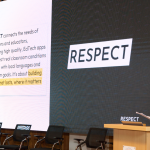February 26, 2022
In this article, John Traxler, Professor of Digital Learning and UNESCO Chair in Innovative Informal Digital Learning in Disadvantaged and development Contexts, discusses why we should consider decolonising Edtech.
I contributed to the panel at ALT-C last year discussing the Association’s new ethics framework and at some point, according to a flutter on Twitter, “@johntraxler suggested we need to decolonise learning technology.”
A great idea whose time may have come! Certainly, it would align with moves to ‘decolonise the curriculum’ and moves to ‘decolonise research’ but what exactly might it actually mean?
This might help, “Colonialism is a practice of domination, which involves the subjugation of one people to another”, according to the Stanford Encyclopedia of Philosophy. Meanwhile, a manifesto from students at Keele University offers more, saying, “Decolonization … involves a paradigm shift from a culture of exclusion and denial to the making of space for other political philosophies and knowledge systems. It’s a culture shift to think more widely about why common knowledge is what it is, and in so doing adjusting cultural perceptions and power relations in real and significant ways.”

This sounds political and abstract but events at universities in Cape Town and Oxford, tagged as #RhodesMustFall, make it clear that feelings run high, as do the wider #BLM movement and recent events around the Colston statue in Bristol.
A subsequent event organised by the Association for Learning Technology helped us to develop an understanding the implications of ‘decolonisation’ for those who use ‘edtech’. Edtech was itself a problematic term, because it never distinguished between dedicated systems like Turnitin, Moodle, Leganto and e:Vision, and the wider informal environment of systems like WhatsApp, Facebook and Twitter but the underlying concerns embrace any of these systems and how they are used.
The focus of discussion so far was, however, what we might call, the ‘soft’ end of edtech where words, if we could find the right ones, could be changed. What about the ‘hard’ end, the hardware, software and policies that deliver edtech in our schools, colleges and universities. What would the developers, vendors and managers of edtech recognise as ‘colonial’ and what could they change?
My original remark, subsequently pursued by John Couperthwaite of ALT, was just the spontaneous assumption that there was a question that needed to be asked, but not one to which I actually had the answer. I did however realise that the topic had been on my mind for quite a few years in different forms.
My view was that digital technology was instrumental in increasing the disadvantage of peoples, communities and cultures that are different and distant from the norms, values, habits, styles, languages and cultures of the global and national mainstreams, specifically those of the dominant global Anglophone digital corporations. Digital technology in education. I had argued, was re-arming colonialism or perhaps arming neo-colonialism.
This happened in a multitude of ways.
Take simple messaging. My Arab colleagues text in English rather than their mother tongue because the ASCII base for English texts is cheaper than the Unicode base for Arabic; my Chinese colleagues had until recently to use the simplified Latin font for Chinese (pinyin) rather than Chinese characters because the latter needed the introduction of the graphic interfaces and character prediction of smartphones. In both cases, the users were skewed away from their native preferences and towards American English.
Similar examples abound in speech recognition, such as Dragon, Alexa or Siri, where most languages, except English and other global ‘power languages’, and most dialects, except the standard, are not supported. Haptic interfaces favour European gestures and do not favour cultures with a different gestural vocabulary. Autocorrect is often another form of bias as is predictive text, skewing users towards a particular standard American lexicon – it will for example often capitalise james but not john. It is likely that automatic language translation, such as Google Translate, has a similar impact on languages and dialects.
RECOMMENDED: https://global-edtech.com/category/community/
Icons and graphic interfaces are usually derived from a European or American cultural context and most applications and operating systems are American in origin and culture, with those for most African languages only gradually gaining popularity through Linux distributions. Perhaps the textual dominance of American English is being replaced by graphical dominance of American images and icons. The massive popularity of emoticons and emojis in mobile phones – and soon in robotics – assumes there is some common global consensus about their meaning, the ‘thumbs up’ for example, but studies suggest this cannot be assumed and might just be another way in which globalised forms override local ones.
There are also well documented concerns about bias within the search engines and artificial intelligence that underpin much of education activity and enquiry.
Whilst this seems to represent a comprehensive threat to many fragile and indigenous languages, some of these languages are now finding their way onto digital devices as apps, dictionaries, courses and games. This seems to be the product of tech-savvy diasporas. It does however raise questions about the ‘ownership’ of a language, and of the values and traditions that it transmits, as it shifts from indigenous elders to younger geeky ex-pats.
These remarks mostly seem to address the experiences of digital learning of communities outside western Europe and North America but even in the UK we should be asking ourselves,
- what examples do students experience day-to-day of white European influences in educational technology?’
- which different icons, terms, gestures or emoji, in say Windows or iPhone, seem derived from white western culture? Or are not relevant to other cultures?
- are graphic interfaces (eg Windows) better than textual ones (MS-DOS) for people not from mainstream white European cultures?
- which aspects of computer, mobile, tablet or peripheral hardware are based around earlier western formats or practices, folders, clocks and files for example?
- which functions or activities within a VLE/LMS, say Canvas, MOODLE, etc, seem derived the practices of western education systems, or not? Or Turnitin?
- in what ways would students from Chinese, Roma, Welsh, Punjabi, Russian, Urdu, Kikuyu, or Cree cultures feel disadvantaged using standard western educational technologies?
An earlier event, an Alpine Rendezvous workshop, nearly ten years earlier, had explored the ongoing global crises, the ecological, economic, political crises, and asked whether educational technology was complicit in these crises, was it perpetuating the status quo, was it evading responsibility by deferring to educational managers. We also asked whether the edtech community saw itself, saw technology, research and education as unconditionally benign, scientifically dispassionate and objective.
Some of the questions addressed at the Rendezvous included,
- Have we implicitly assumed that the western/European model of universities is necessarily the sole or best expression of a culture’s or a community’s higher learning and intellectual enquiry?
- As western/European pedagogy, or rather the corporatised, globalised versions of it, now deploys powerful and universal digital technologies in the interests of profit-driven business models, should we look at empowering more local and culturally appropriate forms of understanding, knowing, learning and enquiring?
- Is encapsulating the world’s higher learning in institutions increasingly modelled on one format and driven by the same narrow global drivers resilient and robust enough, diverse and flexible enough to enable different communities, cultures and individuals to flourish amongst the dislocation and disruption we portray as characterising the crises?
- Our responses, for example personal learning environments or the digital literacies agenda, seem implicitly but unnecessarily framed within this western/European higher education discourse – can these be widened to empowered other communities and cultures entitled to the critical skills and participation necessary to flourish in a world of powerful digital technologies in the hands of alien governments, corporations and institutions?
These questions seem potentially very abstract and well beyond the brief of education technologists, but they do however articulate the wider context in which we all work and highlight the need or scrutiny and vigilance.










0 Comments